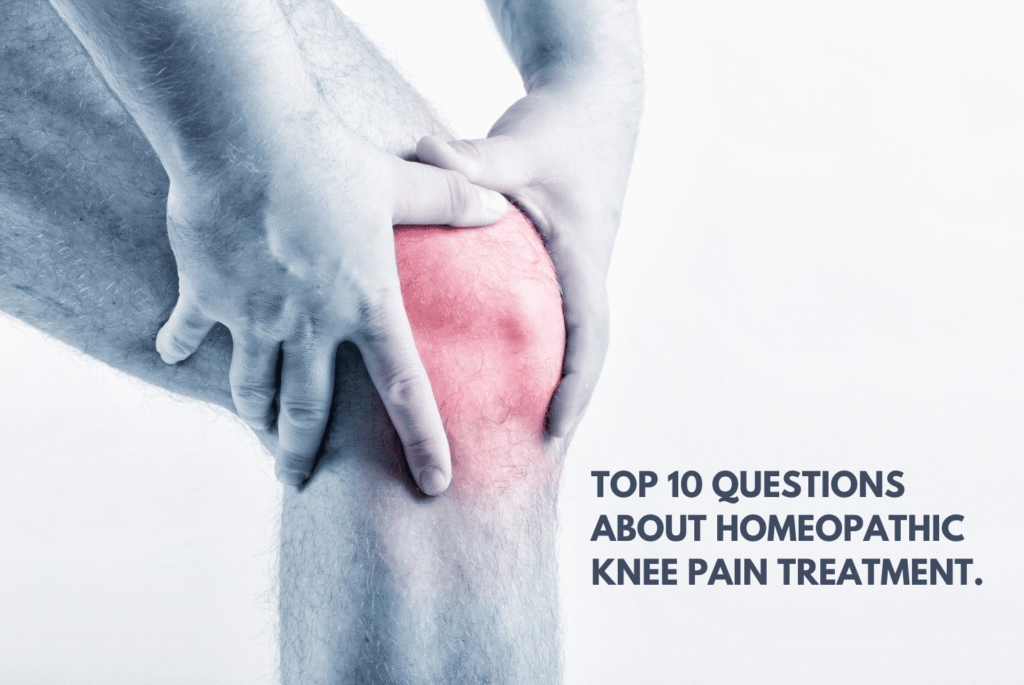we answer the top 10 most frequently asked questions about knee pain treatment in homeopathy, offering clear insights and expert-backed information. Knee pain is a growing concern among people of all ages. Whether it stems from injury, arthritis, or wear and tear, many individuals seek natural, side-effect-free alternatives to manage it. Homeopathy has become an increasingly popular choice for those looking for holistic and long-term relief.
1. Which homeopathic medicine is best for knee pain?
There isn’t a one-size-fits-all remedy in homeopathy. However, here are some commonly prescribed homeopathic medicines for knee pain.
- Rhus toxicodendron – ideal for joint stiffness and pain that improves with motion.
- Apis mellifica – for swelling and burning sensations in the knees.
- Calcarea carbonica – for knee pain aggravated by exertion or cold.
- Caulophyllum – typically used in women for joint stiffness.
- Causticum – helpful when joints feel weak or paralyzed.
- Cimicifuga – used for muscular and cramping pain.
- Dulcamara – pain worsened by damp and cold weather.
- Ruta graveolens – effective for arthritis with stiffness, especially after exertion.
Consulting a homeopath is essential for identifying the most suitable remedy based on individual symptoms.
2. Which is stronger, 200C or 30C in homeopathy?
In homeopathy, potency increases with the number. So, 200C is considered stronger than 30C. However, stronger doesn’t mean better—it depends on the patient’s condition, sensitivity, and chronicity. A qualified homeopath decides the right potency based on these factors.
3. Is Rhus tox good for knee pain?
Yes, Rhus toxicodendron (Rhus tox) is one of the most frequently used remedies in managing knee osteoarthritis. Clinical observations show significant improvement in symptoms like stiffness and restricted movement. It works particularly well when pain worsens after rest and improves with gentle movement.
4. Can homeopathy reduce knee swelling and inflammation?
Yes. Homeopathy includes remedies specifically targeting inflammation and swelling. Medicines like Apis mellifica, Bryonia alba, and Belladonna are often used based on symptoms. When prescribed correctly, they can help reduce knee swelling without causing side effects.
5.Is homeopathy effective for post-injury knee recovery?
Absolutely. Remedies like Arnica montana, Ruta graveolens, and Rhus tox are often prescribed for recovery after sprains, strains, or trauma to the knee. Homeopathy may speed up healing, reduce bruising, and help restore mobility when used under professional guidance.
6. Which vitamin is good for the knees?
Several vitamins support joint health and flexibility:
- Vitamin C – aids in collagen production and cartilage repair.
- Vitamin K – supports bone strength and joint structure.
- Vitamin E – protects joints from oxidative damage.
- Vitamin B complex – improves energy and reduces stiffness.
- Vitamin D – Maintaining a balanced diet with these vitamins can help manage or prevent knee pain.
7. What is the main problem behind knee pain?
Common causes include:
- Ligament injuries
- Cartilage tears
- Tendonitis
- Arthritis
These issues may arise from aging, overuse, injury, or poor biomechanics. Identifying the root cause is crucial for effective treatment
8. What deficiency causes knee pain?
Deficiencies in essential nutrients like Vitamin D and Calcium are known to contribute to knee pain. These nutrients are vital for maintaining strong bones and healthy cartilage. Other relevant deficiencies include Vitamin K, Vitamin B12, and Iron—all of which support joint function and prevent pain associated with bone degeneration.
9. Can a vitamin deficiency be the root cause of knee pain?
Yes, particularly deficiencies in Vitamin D and Calcium. These are essential for bone density and joint strength. Lacking them can lead to weakened cartilage and increased joint pain. Additional contributors may include low levels of Vitamin K, B12, and Iron.
10. Is there any permanent solution for knee pain?
Knee pain—especially from chronic conditions like osteoarthritis—is generally a long-term issue. While there may not be a “permanent cure,” homeopathic treatment aims to manage symptoms, improve mobility, and potentially slow the progression of the condition. In severe cases, surgical options like knee replacement may be considered, but homeopathy can still play a supportive role.
Conclusion
Homeopathy offers a safe and effective path to knee pain relief by addressing the underlying causes, not just the symptoms. At Dr. Basil Homeo Hospital, patients receive advanced care through pure German medicines and holistic treatment options.
Many patients report lasting improvements, with reduced pain, better joint flexibility, and an overall boost in quality of life—all without relying on surgery or heavy medication. These real-life results highlight the power of personalized homeopathic care.
If you’re seeking natural, long-term relief from knee pain, Dr. Basil Homeo provides a trusted and proven approach to get you moving again, comfortably and confidently.
Source: Google(The content was curated using Google’s autocomplete suggestions, “People Also Ask” questions, and trending search data to ensure relevance and accuracy.)

Dr Basil Homeo Hospital
Dr. Basil’s Homeo Hospital, recognized as the Best Homeopathy Hospital in India, provides holistic healing through the power of Homeopathy. Furthermore, with years of expertise and a personalized approach, we have successfully treated chronic and acute conditions, helping thousands regain health and vitality.

